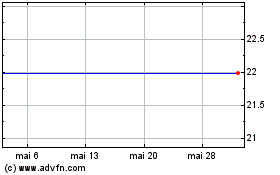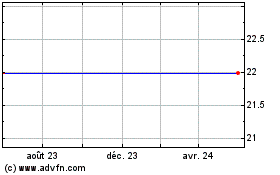Emerging Markets To Make Half Of Pharma Sales Growth By '13 -Study
16 Mars 2010 - 6:11PM
Dow Jones News
About half the pharmaceutical industry's growth is expected to
come from emerging markets by 2013, with China taking the place of
France as the world's third-largest market by as soon as next year,
according to a new study released Tuesday.
The report published by IMS Health Inc. (RX), a third-party data
collector for the health-care industry, also warned that large
multinational pharmaceutical companies are largely "under-exposed
and under-performing" in these high-growth areas, dubbed
"pharmerging" markets.
"Companies must act now and act fast to respond to the market
changes and seize the opportunities within them," IMS said, or else
they will lose to local drug manufacturers.
Sales in emerging markets are expected to grow by around $90
billion by 2013, by which time they will be making up 48% of annual
market growth, said the report. By contrast, these markets
contributed 37% of growth for 2009.
The data underscores a shift for drug makers towards the
developing world where steadily growing economies along with rising
per-capita income is boosting demand for medications.
On the flipside, sales growth in mature pharmaceutical markets
are slowing thanks to patent expirations, tighter government
regulation, and because producers of generic medications are
seizing market share at a faster clip. Economic concerns in the
developed world may too pose a lasting problem.
The report identified 17 countries that fit the high-growth
model and "are about to overturn the established pharmaceutical
world order."
They are classified into three tiers. China, with its gross
domestic product north of $8 trillion, tops the list. The Asian
giant is projected to contribute $40 billion in annual sales growth
by 2013, on par with sales growth forecast for the U.S. during the
same time.
Branded generics will make up much of the growth in China and
will be supplied by local producers, though "demand for innovative
products from multinational companies is rising in the country's
leading urban centers," IMS said.
Brazil, Russia and India make up the next group; each will add
$5 billion to $15 billion in sales over the next three years.
Brazil is expected to overtake the United Kingdom as the world's
eighth-largest pharmaceutical market by next year.
The thirteen countries listed in the third tier will see $1
billion to $5 billion in growth and include Venezuela, Argentina,
Turkey, Mexico, Indonesia, and Vietnam, among others.
Many large pharmaceutical companies have already highlighted
this trend but have done too little, IMS said.
"In 2009, the world's top 15 pharmaceutical manufacturers
derived just 0.9% of their combined sales from China; 2.9% from the
second-tier markets of Brazil, India and Russia; and 5.6% from the
third-tier markets."
There are signs, however, that the industry is making a more
concerted effort to target these markets. A series of large
multinationals have announced acquisitions in recent years and many
have begun joint ventures with local manufacturers
AstraZeneca PLC (AZN), U.K.'s second-largest pharmaceuticals
company, Tuesday said it is targeting double-digit growth from
emerging markets and expects those countries to generate
one-quarter of its total sales by 2014. The company said emerging
markets look set to contribute around 70% of pharmaceutical
industry growth in the next five years.
-Kejal Vyas, Dow Jones Newswires; 212 416 2185;
kejal.vyas@dowjones.com
IMS Health (NYSE:RX)
Graphique Historique de l'Action
De Avr 2024 à Mai 2024

IMS Health (NYSE:RX)
Graphique Historique de l'Action
De Mai 2023 à Mai 2024
